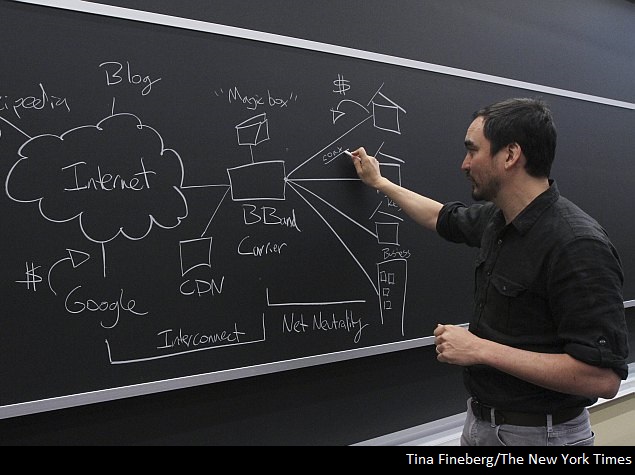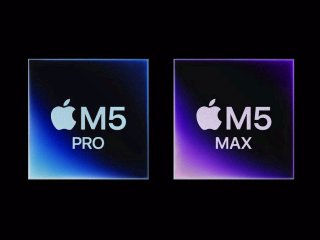- Home
- Internet
- Internet News
- Defending the Open Internet
Defending the Open Internet

The future of the Internet - which means the future of communications, culture, free speech and innovation - is up for grabs.
The Federal Communications Commission is making decisions that may determine how open the Internet will be, who will profit most from it and whether startups will face new barriers that will make it harder for ideas to flourish.
Tim Wu, 41, a law professor at Columbia University, isn't a direct participant in the rule making, but he is influencing it. A dozen years ago, building on the work of more senior scholars, Wu developed a concept that is now a generally accepted norm. Called "net neutrality," short for network neutrality, it is essentially this: The cable and telephone companies that control important parts of the plumbing of the Internet shouldn't restrict how the rest of us use it.
Most everyone embraces net neutrality, yet the debate over how to accomplish it is so volatile that more than 1 million signatures have been filed protesting FCC regulations that haven't even been proposed yet. (They may be released in draft form Thursday.)
What makes the current debate so contentious is that the FCC has signaled its intention to grant cable and telephone companies the right to charge content companies like Netflix, Google, Yahoo or Facebook for speeding up transmissions to people's homes. And this is happening as the FCC is considering whether to bless the merger of Comcast and Time Warner Cable, which could put a single company in control of the Internet pipes into 40 percent of U.S. homes.
In other words, these arcane matters of engineering and jurisprudence stir people up because they appear to violate net neutrality.
"Sometimes what everybody thinks about the law is more important than what the law itself says," Wu told me recently in his office. "I think that's what's happened with net neutrality. It's become a kind of norm of behavior, what you can and can't appropriately do with the Internet. It's got to be open. Except for legitimate purposes like protecting the network itself, there shouldn't be discrimination against one form of content or another or one provider or another. And people generally accept that. Until now, the idea in a way has been more important than what the regulations have actually said."
But what the law says is important, even paramount, and Wu is one of the most influential voices arguing that net neutrality be fully protected by law and regulation, which, in his view, means treating the Internet like a regulated utility, for the good of all. That remedy may not happen immediately. But his opinion is nonetheless sought out by rule makers.
A perpetual frontier
On a rainy May afternoon, Wu sat in his cluttered office discussing the state of the Internet and his place in it.
A child of peripatetic scientists, he was born in Washington and spent formative years in Basel, Switzerland, and Toronto. His father, born in Taiwan, was a noted immunologist. He died in 1981, when Wu was 8. His mother, who moved from London to Canada as a child, is an immunologist at York University in Toronto.
Thanks to his mother's farsighted purchase of an Apple II computer in 1982, Tim Wu says proudly that he became something of a geek. "That computer changed our lives, my brother's and mine," he said.
In high school, Tim Wu got a part-time job writing software, while operating an online bulletin board, "the main purpose of which was to move around pirated software," he said. "Hey, it was a different time." His younger brother, David, is now a computer game software developer.
A biochemistry major at McGill University, Wu was headed toward a career in "the family business - science," when, he noted wryly, "I had a sort of rebellion." It took the form of an application to Harvard Law School, where he spent the next three years. But he didn't really know why he was at Harvard until he wandered into a cyberlaw class taught by Lawrence Lessig, an early advocate of an open Internet. "I didn't know what cyberlaw was exactly, but it seemed cool," Wu said. "Larry gave me my calling."
Lessig said he recognized that Wu was "unusually gifted" and helped arrange two clerkships for him. (Several years later, Lessig recommended that another student receive the same clerkships, and she did. Her name is Kathryn Judge. She is also a Columbia law professor and Wu's wife.)
For one year, Wu worked for Richard A. Posner, a federal appellate court judge, influential University of Chicago law professor, prolific author and blogger. "Richard Posner is a kind of law demigod," Wu said. "He didn't really need a clerk. He wrote everything on his own. But he wanted someone to be his critic - to match wits with him intellectually, to fight with him and tell him why he was wrong."
Posner encouraged Wu to be a contrarian - and to find an independent road in the broad territory between heavy-handed government interference and free-market anarchy.
In 1999 and 2000, Wu served as a clerk to Justice Stephen G. Breyer of the U.S. Supreme Court. There he played a different role. Breyer's law clerks, Wu said, were expected to find out what the other justices were contemplating. "One of Breyer's favorite things was to ask, 'What does Sandra think?,'" referring to Justice Sandra Day O'Connor, who was often the pivotal vote until she retired in 2006. "He believed he had a big job trying to defend the middle ground in the court - to form a caucus of reasonable adults."
In 2000, as Wu's clerkship came to a close, the country was infected with dot-com fever. And even at the Supreme Court, he caught a case of it. With his legal pedigree and programming skills, he was in high demand. He opted for a high-risk, high-reward opportunity: a marketing job with a startup firm in Silicon Valley called Riverstone Networks. The company, he said, "promised to make us all rich."
Instead, it made him disillusioned. He says he was appalled by the business practices around him. "Network neutrality came out of the bad things there," he said.
The company sold industrial-size Internet routers that were being used, Wu recalls, "to block and prioritize Internet traffic, to discriminate against traffic, basically, to do many of the things that I think companies on the Internet shouldn't be doing." He went to China for the company and found that the equipment he was dealing in was of interest to the Chinese for its potential to abet censorship.
"Helping the Chinese government censor dissidents wasn't the way I wanted to spend the rest of my life," he said. "It hit me that we weren't on the good side there." The idea of net neutrality grew, in part, because "I had personal experience of violations of it," he said.
That was only part of the problem. The company's top executives were engaging in activities that the Securities and Exchange Commission and federal prosecutors said were improper. His immediate boss, Andrew Feldman, ultimately pleaded guilty to a felony count of violating internal accounting controls, and Feldman and four other top executives agreed to an SEC settlement in a complaint accusing them of a scheme to defraud investors by misstating revenues.
Wu was untouched by the investigations, but said he had known that things weren't right.
It all crystallized for him on Sept. 12, 2001 - the day after the Sept. 11 attacks. He was stranded in Atlanta at a trade show with other company employees. Their business engagements were canceled because of the attacks, and, with no other plans, his colleagues decided to go to a strip club. On such a solemn day, the tawdry revelry repelled him.
"I wondered how I'd gotten there," he recalls. "I realized that what we'd been doing all those months was abhorrent." He had been living in a world based on nothing but money, he said, and saw that "the idea that the private sector, the free market, on its own has all the solutions is just a myth." He added: "When it's just about money, there are no values."
He looked for a way out and got a job teaching law at the University of Virginia. But the Internet preoccupied him. "I thought of it as a kind of perpetual frontier, the place where everyone gets a shot, where the underdogs have a chance. The Internet has been that. And I wanted some principles that would keep it that way."
He got back in touch with Lessig, who encouraged him in May 2002 to put his thoughts down on paper. The result was a sparkling memo, "A Proposal for Network Neutrality," that asked: "What principle can balance the legitimate interests of broadband carriers in administering their networks with the danger of harm to new application markets? And how can such a principle be translated into both clear legal guidelines and the practice of network design?" The answer was in the title: a new creation called network neutrality. Lessig began sending the paper to his contacts the next month.
Wu's ideas spread, reaching top staff members at the FCC, who brought them to the attention of Michael Powell, then the commission chairman.
"I was convinced by Tim Wu's ideas," Powell said. He cited Wu in a major speech in 2004, calling on Internet providers to refrain from blocking or restricting data or applications available to consumers. He asked consumers to "challenge their broadband providers to live up to these standards and to let the commission know how the industry is doing." In 2005, the FCC enjoined Madison River Communications, a telephone company, from blocking phone service over the Internet. In essence, Powell told me, "the FCC made network neutrality the law of the land."
The 'Common Carrier' debate
The argument today is not so much whether net neutrality is a good concept - most people agree that it is - but what it means in practice.
Lessig and Wu both say Powell was effective in maintaining an open Internet. He used a very light regulatory hand - and this has left some issues unresolved to this day. He decided that the Internet was "an information service" and not a "common carrier." This semantic difference is crucial. Common carriers, like phone companies, are more tightly regulated, and while Powell prohibited the arbitrary blocking or setting of priorities for Internet traffic, he did so without invoking the FCC's authority over common carriers, which is embodied in Title II of the Communications Act of 1934.
This point has haunted the FCC ever since. In January, the U.S. Court of Appeals for the District of Columbia Circuit struck down open Internet rules that had been in place since 2010. The court said the FCC had regulated broadband carriers as though they were common carriers, yet the agency hadn't designated them as such.
Congress could intervene, but has not done so. One reason for his original decision, Powell said, was that the Internet needed enormous capital investment, which would have been deterred by tighter regulations. "If I thought Congress wanted to throw $10 billion or $20 billion or $30 billion a year into building up the infrastructure, I'd be willing to have a conversation about how to regulate such a system."
Today, Powell speaks as the head of the cable industry's trade organization. "Now that private markets have created a system with certain expectations on return of capital," he said, "it would be wrong, from many perspectives, to change the rules and confiscate what has been a public good."
Wu and his allies argue that broadband carriers - basically the telephone and cable companies - do, in fact, function as common carriers. In their view, the Internet is increasingly crucial to the economy, society and the political system, and its openness to all comers needs to be enforced by the FCC, which should invoke its full authority under Title II.
Netflix has already begun making deals with Comcast and Verizon Communications to ensure swift transmissions from its servers to their broadband networks, and with the new FCC proposals, priority service might be permitted through the "last mile" of these networks - that is, through the broadband networks into people's homes. Wu says both sorts of commercial prioritization should be regulated under Title II.
Andrew McLaughlin, chief executive of Digg, a news collection site, said he was worried that if big companies were allowed to buy priority service on the Internet, "it will be harder for two guys in a garage with a great idea to innovate and get their ideas out and compete."
McLaughlin was an adviser to President Barack Obama on these issues from his election in November 2008 through 2010. McLaughlin's words echoed comments made by the president in February 2010 in an interview on YouTube.
"I'm a big believer in net neutrality," Obama said. "We're getting pushback, obviously from some of the bigger carriers, obviously who would like to charge more fees and extract more money from wealthier customers, but we think that runs counter to the whole spirit of openness that has made the Internet such a powerful engine not only for economic growth but also for the generation of ideas and creativity."
Many companies, including content providers like Netflix and Yahoo; social media sites like Facebook, Twitter and Reddit; search sites like Google and Microsoft's Bing; and e-commerce companies like Amazon, say they worry that the FCC might give "broadband gatekeepers" control.
In a letter to the FCC last week, these companies and many others said the new rule making "represents a grave threat to the Internet." Cable and telephone industries respond that it is in their own interests to keep the Internet open. The main question, they say, is whether content providers will help pay for the cost of operating and building the network. "That's just a financial issue," Powell said. "It's not a question of principle."
Some scholars say there are merits to the FCC's apparent approach. Philip J. Weiser, dean of the University of Colorado Law School, said, common-carrier regulation "is not a panacea." If the FCC were to use it, he said, there would most likely be years of litigation. Even if the classification withstood a legal challenge, he said, it might not improve the situation. Priority service would presumably be permitted for a "reasonable fee" so long as that fee was offered to everybody.
"It's like FedEx," he said. "You pay a certain amount for overnight delivery and a certain amount for two-day delivery. You could end up with something like that for the Internet."
The agency's evident strategy is fraught with problems, and there has been dissension in its own ranks. "The FCC appears to be attempting to thread a needle," said Christopher S. Yoo, a law professor at the University of Pennsylvania. It wants to avoid invoking Title II, he said, while adding enough conditions to a standard of "commercial reasonableness" for prioritizing Internet transmissions to satisfy the courts as well as the fiercest net-neutrality advocates. "I don't think we'll know for a while whether they can succeed."
© 2014, The New York Times News Service
For details of the latest launches and news from Samsung, Xiaomi, Realme, OnePlus, Oppo and other companies at the Mobile World Congress in Barcelona, visit our MWC 2026 hub.
Related Stories
- Samsung Galaxy Unpacked 2026
- iPhone 17 Pro Max
- ChatGPT
- iOS 26
- Laptop Under 50000
- Smartwatch Under 10000
- Apple Vision Pro
- Oneplus 12
- OnePlus Nord CE 3 Lite 5G
- iPhone 13
- Xiaomi 14 Pro
- Oppo Find N3
- Tecno Spark Go (2023)
- Realme V30
- Best Phones Under 25000
- Samsung Galaxy S24 Series
- Cryptocurrency
- iQoo 12
- Samsung Galaxy S24 Ultra
- Giottus
- Samsung Galaxy Z Flip 5
- Apple 'Scary Fast'
- Housefull 5
- GoPro Hero 12 Black Review
- Invincible Season 2
- JioGlass
- HD Ready TV
- Latest Mobile Phones
- Compare Phones
- Apple iPhone 17e
- AI+ Pulse 2
- Motorola Razr Fold
- Honor Magic V6
- Leica Leitzphone
- Samsung Galaxy S26+
- Samsung Galaxy S26 Ultra
- Samsung Galaxy S26
- MacBook Pro 16-Inch (M5 Max, 2026)
- MacBook Pro 16-Inch (M5 Pro, 2026)
- Apple iPad Air 13-Inch (2026) Wi-Fi + Cellular
- Apple iPad Air 13-Inch (2026) Wi-Fi
- Huawei Watch GT Runner 2
- Amazfit Active 3 Premium
- Xiaomi QLED TV X Pro 75
- Haier H5E Series
- Asus ROG Ally
- Nintendo Switch Lite
- Haier 1.6 Ton 5 Star Inverter Split AC (HSU19G-MZAID5BN-INV)
- Haier 1.6 Ton 5 Star Inverter Split AC (HSU19G-MZAIM5BN-INV)

















